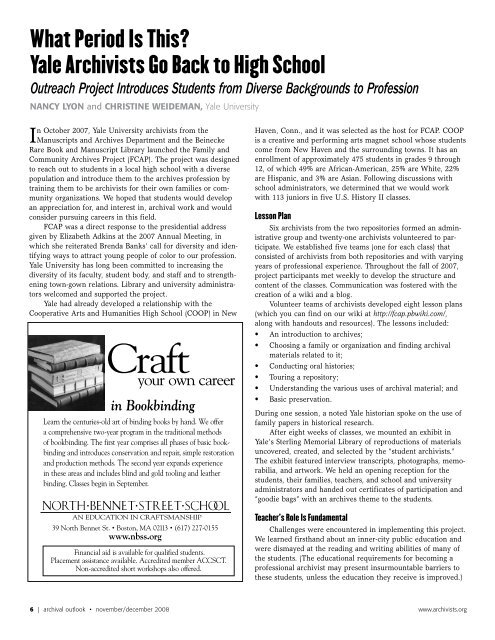Tally Ho! - Society of American Archivists
Tally Ho! - Society of American Archivists
Tally Ho! - Society of American Archivists
You also want an ePaper? Increase the reach of your titles
YUMPU automatically turns print PDFs into web optimized ePapers that Google loves.
What Period Is This?<br />
Yale <strong>Archivists</strong> Go Back to High School<br />
Outreach Project Introduces Students from Diverse Backgrounds to Pr<strong>of</strong>ession<br />
NANCY LYON and CHRISTINE WEIDEMAN, Yale University<br />
In October 2007, Yale University archivists from the<br />
Manuscripts and Archives Department and the Beinecke<br />
Rare Book and Manuscript Library launched the Family and<br />
Community Archives Project (FCAP). The project was designed<br />
to reach out to students in a local high school with a diverse<br />
population and introduce them to the archives pr<strong>of</strong>ession by<br />
training them to be archivists for their own families or community<br />
organizations. We hoped that students would develop<br />
an appreciation for, and interest in, archival work and would<br />
consider pursuing careers in this field.<br />
FCAP was a direct response to the presidential address<br />
given by Elizabeth Adkins at the 2007 Annual Meeting, in<br />
which she reiterated Brenda Banks’ call for diversity and identifying<br />
ways to attract young people <strong>of</strong> color to our pr<strong>of</strong>ession.<br />
Yale University has long been committed to increasing the<br />
diversity <strong>of</strong> its faculty, student body, and staff and to strengthening<br />
town-gown relations. Library and university administrators<br />
welcomed and supported the project.<br />
Yale had already developed a relationship with the<br />
Cooperative Arts and Humanities High School (COOP) in New<br />
Craft<br />
your own career<br />
in Bookbinding<br />
Learn the centuries-old art <strong>of</strong> binding books by hand. We <strong>of</strong>fer<br />
a comprehensive two-year program in the traditional methods<br />
<strong>of</strong> bookbinding. The first year comprises all phases <strong>of</strong> basic bookbinding<br />
and introduces conservation and repair, simple restoration<br />
and production methods. The second year expands experience<br />
in these areas and includes blind and gold tooling and leather<br />
binding. Classes begin in September.<br />
AN EDUCATION IN CRAFTSMANSHIP<br />
39 North Bennet St. • Boston, MA 02113 • (617) 227-0155<br />
www.nbss.org<br />
Financial aid is available for qualified students.<br />
Placement assistance available. Accredited member ACCSCT.<br />
Non-accredited short workshops also <strong>of</strong>fered.<br />
Haven, Conn., and it was selected as the host for FCAP. COOP<br />
is a creative and performing arts magnet school whose students<br />
come from New Haven and the surrounding towns. It has an<br />
enrollment <strong>of</strong> approximately 475 students in grades 9 through<br />
12, <strong>of</strong> which 49% are African-<strong>American</strong>, 25% are White, 22%<br />
are Hispanic, and 3% are Asian. Following discussions with<br />
school administrators, we determined that we would work<br />
with 113 juniors in five U.S. History II classes.<br />
Lesson Plan<br />
Six archivists from the two repositories formed an administrative<br />
group and twenty-one archivists volunteered to participate.<br />
We established five teams (one for each class) that<br />
consisted <strong>of</strong> archivists from both repositories and with varying<br />
years <strong>of</strong> pr<strong>of</strong>essional experience. Throughout the fall <strong>of</strong> 2007,<br />
project participants met weekly to develop the structure and<br />
content <strong>of</strong> the classes. Communication was fostered with the<br />
creation <strong>of</strong> a wiki and a blog.<br />
Volunteer teams <strong>of</strong> archivists developed eight lesson plans<br />
(which you can find on our wiki at http://fcap.pbwiki.com/,<br />
along with handouts and resources). The lessons included:<br />
• An introduction to archives;<br />
• Choosing a family or organization and finding archival<br />
materials related to it;<br />
• Conducting oral histories;<br />
• Touring a repository;<br />
• Understanding the various uses <strong>of</strong> archival material; and<br />
• Basic preservation.<br />
During one session, a noted Yale historian spoke on the use <strong>of</strong><br />
family papers in historical research.<br />
After eight weeks <strong>of</strong> classes, we mounted an exhibit in<br />
Yale’s Sterling Memorial Library <strong>of</strong> reproductions <strong>of</strong> materials<br />
uncovered, created, and selected by the “student archivists.”<br />
The exhibit featured interview transcripts, photographs, memorabilia,<br />
and artwork. We held an opening reception for the<br />
students, their families, teachers, and school and university<br />
administrators and handed out certificates <strong>of</strong> participation and<br />
“goodie bags” with an archives theme to the students.<br />
Teacher’s Role Is Fundamental<br />
Challenges were encountered in implementing this project.<br />
We learned firsthand about an inner-city public education and<br />
were dismayed at the reading and writing abilities <strong>of</strong> many <strong>of</strong><br />
the students. (The educational requirements for becoming a<br />
pr<strong>of</strong>essional archivist may present insurmountable barriers to<br />
these students, unless the education they receive is improved.)<br />
6 | archival outlook • november/december 2008 www.archivists.org


